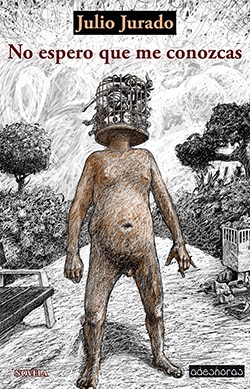
Original language: Español
Year of publication: 2023
Valuation: Between recommendable and okay (although not for everyone)
I go to I don’t expect you to know me without knowing Julio Jurado, its author, beforehand. I am attracted by the suggestive title of the novel, the strange illustration on the cover and the unorthodox synopsis offered by the publisher.
As I read the work, I am seduced by its conceptual ambition and the narrative risks it takes. And I finished it satisfied; Perhaps it is not perfect, nor has it been executed with all the brilliance that its premise encouraged, but I value its avant-garde courage and its ability to take the story in extravagant directions.
At this point, I want to clarify that not everyone will enjoy I don’t expect you to know me. In the end, it is, rather than a conventional novel, a literary artifact that mixes fiction (especially the noir genre with fantastic, absurd, dreamlike and anguishing overtones) with meta-literary searches.
The writer himself is aware that his product can become masturbatory, anarchic, gratuitous and repetitive; He even admits that he is pierced “by supreme idiocy, a quality too frequent and praised in the literary world.” (page 166) Therefore, it is logical that it discourages more than one. This is constantly emphasized by his first-person narrator. For example, in the following passage: “Wow… I’m sorry. At this moment I must have lost another lot of readers if there is still any who have tolerated this story in some way and who have not run away in search of another one that is much more pleasant and, why not, much better founded: with a profusion of organized index cards. on the table, with a scheme that facilitates the architecture of the plot, and above all, with documentation that raises the quality of the representations and their possible signifiers and meanings.» (pages 238-239)
By the way, it may be time to talk about the aforementioned central story. Well, it is about the life of Anselmo Lobo, a writer in his fifties who tells us about his creative tribulations, his adventures as a serial killer and his romantic adventures. In between there are, among other things, splitting of the self, legs that tremble in anticipation of blood, a wart that moves or polyamorous relationships that involve ghostly lovers.
Anyway; To organize ideas, allow me to list what, in my opinion, are the virtues of I don’t expect you to know me:
- His, I insist, meritorious ambition and endearing “self-awareness.”
- Its structure. This manages to give meaning to the “imposed disorder” (page 147); Likewise, it allows both fiction and metaliterary brushstrokes as well as the past and present to alternate in an understandable and fluid way.
- Certain scenes. They have been very well presented, either because they manage to make their humor work correctly (I think of the interrogation of Inspector Ibáñez narrated in chapter XX) or they erect the intended atmosphere (here the decadent party displayed in chapters IL and L).
- His imagery. Certainly, it seems more dramatic than symbolic or meaningful; However, it produces an undeniable visual impact.
- Various “leimotiv” (the appeal to «supine idiocy» or to «the divine, magical or literary», the quotes to Paparrigópoulos…). They give a slight consistency to a group that tends towards the shapeless and spontaneous.
On the other hand, these are the defects that I find in I don’t expect you to know me:
- It mixes so many ingredients that not all of them develop satisfactorily or resonate with the same charm.
- Although deliberate, its onanism, repetitiveness, and lack of responses may cause some readers to choke.
- The prose, generally competent, could be improved. For example, sticking all the time to the narrator’s linguistic register, reviewing the punctuation here or there and correcting a handful of typos.
Summarizing: I don’t expect you to know me It is an interesting proposal that compensates for its limitations with courage and self-confidence. Still, it won’t get the mainstream reader to tune in. And it is not only necessary to approach it with a certain predisposition, some playful curiosity and patience to endure certain excesses; We must also be very clear that this is much rarer than a simple “story of personal arrogance seasoned with a few crimes (…) in which the boy wins the girl back in the end.” (page 273)
Source: https://unlibroaldia.blogspot.com/2023/12/julio-jurado-no-espero-que-me-conozcas.html


